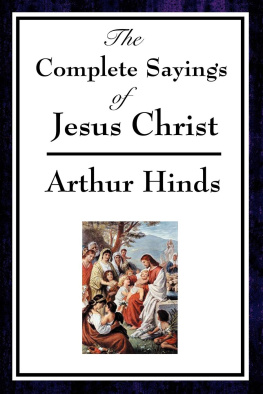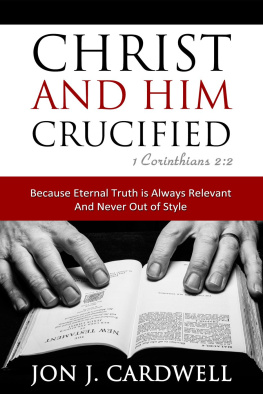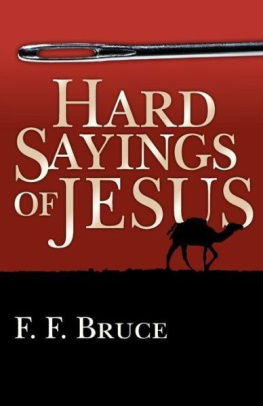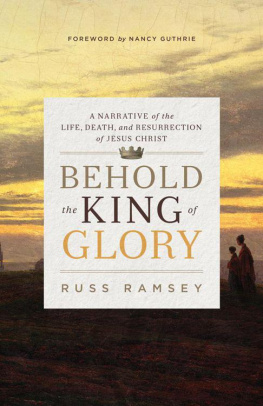Copyright 2022 Isaac Portilla. All rights reserved. Except for brief quotations in critical publications or reviews, no part of this book may be reproduced in any manner without prior written permission from the publisher. Write: Permissions, Wipf and Stock Publishers, W. th Ave., Suite , Eugene, OR 97401 .
W. th Ave., Suite
All Scripture quotations, unless otherwise indicated, are taken from the Holy Bible, New International Version, NIV. Copyright 1973 , 1978 , 1984 , 2011 by Biblica, Inc. Used by permission of Zondervan. All rights reserved worldwide. www.zondervan.com The NIV and New International Version are trademarks registered in the United States Patent and Trademark Office by Biblica, Inc.
Scripture quotations marked (ESV) are from the ESV Bible (The Holy Bible, English Standard Version), copyright 2001 by Crossway, a publishing ministry of Good News Publishers. Used by permission. All rights reserved.
Scripture marked (NKJV) taken from the New King James Version. Copyright 1982 by Thomas Nelson. Used by permission. All rights reserved.
Acknowledgements
I would like to show my gratitude to Professor Stanley Hauerwas (Duke University) for receiving me at his office for a series of meetings during the cold days of January , and for his encouragement and advice regarding the publication of this book. It was during this research visit at Durham that I started working on chapter (the only one I had drafted at the time).
I am grateful to Professor Mario Ignacio Aguilar (Director of the Centre for the Study of Religion and Politics, University of St Andrews) for his advice on the positioning of this book and his invitation to present it at the Scholars at the Peripheries Research Group, where it obtained a wonderful response.
Warm thanks to those who, with their feedback, helped me to shape a better version of this book: Dr. Daniel Spencer (University of St Andrews), for his insightful comments on chapter and our follow-up conversation; Professor N. T. Wright (University of St Andrews, Senior Research Fellow at Oxford), for his valuable response to my inquiry on chapter ; Juan Yusta, for his availability and help in the final revision, and for coordinating sessions and retreats where we have explored some of the themes presented in the book (specifically forgiveness, chapter ).
Very specially, I thank Dr. Ralitza Nikolaeva (University of St Andrews), who read the entire manuscript and gave me excellent advice; also for her companionship and support in this life journey, and her encouragement to write on Christian topics.
I am grateful to Wipf and Stock Publishers for welcoming this project, and also for their trust and flexibility throughout the process.
Chapter 1
As I Have Loved You
The One Commandment
. Love
J esus said, Love each other as I have loved you (John :, emphasis added). He did not say, Love each other as you like, nor Love each other as you can. No. He said, Love each other as I have loved you.
Hence: for much that we fail to see it, for much that we are afraid to say it, we can love like Christ. We can love like Christ not because we want to, out of some grandiose desire of oursto be like the Son of Godbut because he said so; he said we shall love like him. Thus, we will not be proud when we assert this possibility, but faithfulto him. By loving in such a way, we will be contributing to the emergence of a renewed Earth; an Earth crafted by those who are coherent with the teachings of Christ, by those who serve as conductors of the Spirits descent. To love as Christ is not just the way to be truthful to the words of Christ, it is Truth enabled. Such is the main sign of Christ carriersof those who take the responsibility to be the Light in this world, of those who facilitate the transformation of the Earth.
. Difficulty
Jesus said, Love each other as I have loved you.
The most striking implication of this statement is not the act of lovethat is, to love one anotherbut the qualification of such love: that it shall be a Christ-like Love. Without this qualification of love, the one Christian commandment would be incomplete, thus ineffective. As for loving each other, Christ is not needed: Would we deny the existence of relational or fraternal love in the times before Christ, or in those who do not follow the Way of Christ? No, we cannot deny such love, neither in the times before the Light came to stay nor in those who have not committed to the Way of endurance in the Light of being. Anyone who has traveled the world or established friendships beyond their own Christian community knows it: relational and fraternal love were not brought by Christ; Christ-like Love was brought by Christ.
Yet, some Christians forget the last part of the one commandmentas if the statement as I have loved you no longer existed. Such forgetfulness results in the mistaken divinization of affectionate love, because the commandment, as they remember it, is to love each other. And so, certainly feeling affection for one another, they say among themselves: We do love each other as Christ commanded us, dont we? But they forget: you do not need to follow the Way of Christ to love kindly, passionately, compassionately, or in a brotherly, motherly, or fatherly way, because these types of love and affection are not the Gift of Christ. Hence, erroneously assuming Love is a Christian givenpresumed to be there if you are a Christiansome Christians pay attention to just doing the right thing, not giving enough consideration to the way they should loveas Christ did.
Of course, the commandment of Christ to love like him is much more difficult to contemplate than the accumulation of deeds sufficient to feel that one is good enough to be counted as the chosen sheep. But to love as Christ is not a Christian given. It cannot be bought by deeds, although it may be demonstrated in deeds; it cannot be thought of as affection, although it may be accompanied by affection. The command of Christ to love like him is difficult. It is difficult because it is inconvenient. It is inconvenient because it demands the questioning of our self and the transformation of our being. Even so, we should not allow the editing of Christs words in our minds and our hearts. We should not allow the exile from our consciousness of the last part of the one Christian commandment just because it is inconvenient for us. We cannot say that to love one another is the Christian commandment. Only the commandment to love as Christ is faithful to the words of Christ.
. Denial
Jesus said, Love each other as I have loved you.
Without this qualification of love, Christ is denied. That is, if we reject the possibility to love as Christ, we are denying the Christ in uswe decide to not-know the Light of being, and to not-be his living witnesses in the world. Moreover, by denying the Christ in us, we are refusing to embody the Way of Christ: we are battling his call (to follow him), his teaching (to be the Light of the world), and his prayerthat the love with which the Father loved him may be in us, and that he (the Light through and of which things are made) may be in us. Even more, we are rejecting the fruit of his Sacrificethe Atonement of our being for its participation in the Light of sentient creation, which is Christ himself, as Logos and Being.








